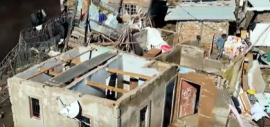
The KwaZulu-Natal government remains on the ground to provide humanitarian assistance to the families that have been displaced by devastating floods following heavy rains that have battered parts of the province on Monday night.
The heavy rains, accompanied by strong winds, wreaked havoc in various parts of the province, affecting five districts, including eThekwini Metro, Ilembe, King Cetshwayo, Umzinyathi, Amajuba and Umkhanyakude District Municipalities.
The preliminary reports indicate that at least 11 people have died, and these include seven people from uThongathi in the north of Durban, and four in Nquthu, Eshowe and KwaHlabisa, respectively.
Over 55 people were reported to have suffered minor to moderate injuries and are receiving medical treatment in hospital.
Dozens of people have also been left homeless after their homes were ripped apart by heavy winds. Three temporary shelters have been established, where the affected families are receiving humanitarian aid.
KwaZulu-Natal Premier Nomusa Dube-Ncube has expressed heartfelt condolences to the families of people that have tragically lost their lives, and wished a speedy recovery to the people who were admitted and are recovering in hospital.
Dube-Ncube led a government delegation to various areas in eThekwini Metro on Tuesday to receive a first-hand report on the extent of the damage and ensure a coordinated rapid response from government.
The Premier said the provincial government’s priority is to ensure that the displaced families receive immediate humanitarian relief and to fast-track the restoration of services.
“We have rallied all government departments to ensure an all-hands on deck approach as we consolidate our rebuilding and recovery plan of action. Our aim is to support affected families to rebuild their lives.
“Assessments are continuing so that work to repair damaged infrastructure can begin. The assessment reports will give us a clear indication of the extent of the damage and funding that will be required,” Dube-Ncube said.
She has also urged the municipalities to ensure that all affected people are profiled and receive the necessary support from government.
Immediate humanitarian aid
Disaster management teams are conducting assessments and coordinating humanitarian efforts for the affected families.
Non-governmental organisations, including the Red Cross, Al-Imdaad Foundation, Gift of the Givers and IPSS Medical Rescue, are working closely with government to ensure the provision of hot meals, mattresses, blankets, food parcels and humanitarian assistance.
uThongathi is currently being classified as the most affected area, with hundreds of houses severely destroyed. Other areas, including Umgababa, south of the eThekwini Metro, Eshowe, Utrecht, Osizweni and KwaHlabisa have also been severely affected.
Public infrastructure, including schools, roads, community halls and health care facilities, were also affected.
Repairing of infrastructure
The Premier said repairs to damaged transformers and powerlines, which left many areas in the eThekwini Metro without power, have started, and power has been restored in some areas, while work continues to ensure that all areas are fully restored by the end of the week.
Overhead electricity infrastructure has been severely impacted. This includes infrastructure above-ground, such as electricity poles, transformers and overhead lines.
The heavy rain also resulted in higher levels of turbidity in raw water abstracted from the uThongathi water works and the water works was shut down for few hours.
The uThongathi water works is presently operating optimally and water supply is being gradually restored.
“Residents are urged to continue to heed weather warnings whenever they are issued to minimise the impact and loss of lives,” Dube-Ncube said. - SAnews.gov.za


